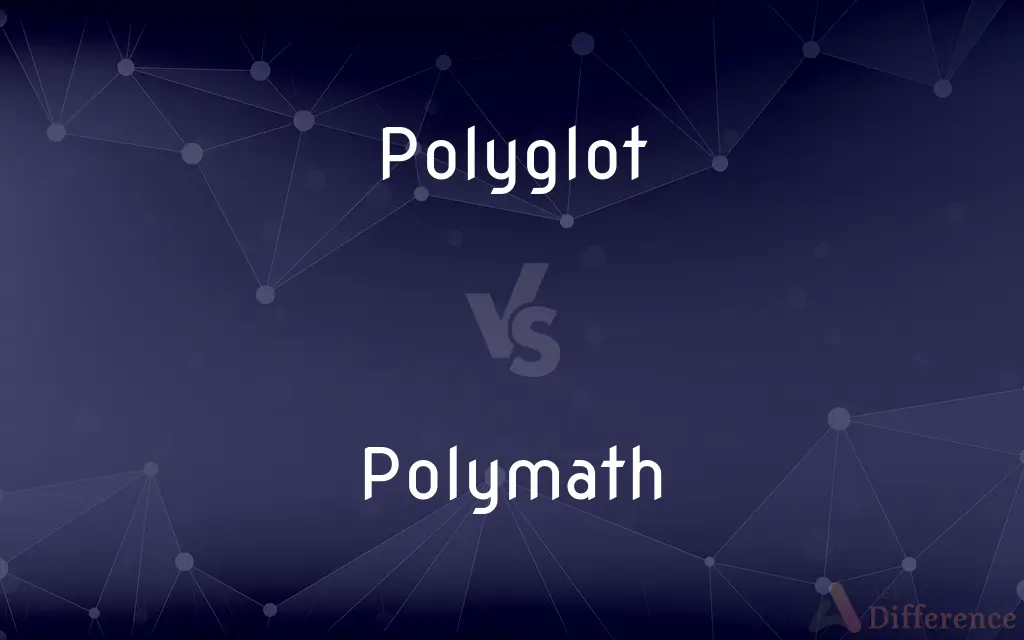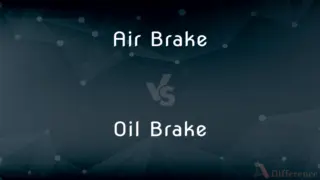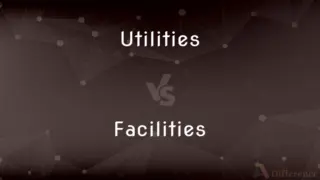Polyglot vs. Polymath — What's the Difference?
Edited by Tayyaba Rehman — By Fiza Rafique — Published on March 7, 2024
A polyglot is someone proficient in multiple languages, while a polymath is a person with knowledge and expertise across a wide range of subjects.

Difference Between Polyglot and Polymath
Table of Contents
ADVERTISEMENT
Key Differences
A polyglot is an individual who has mastered the ability to speak, read, or write in several languages. The term is often used to describe someone fluent in at least three to four languages, but many polyglots can communicate in far more. This linguistic proficiency can be a result of upbringing, educational pursuits, or personal interest in languages and cultures. Polyglots are highly valued in fields like translation, international relations, and global business, where communication across cultural boundaries is crucial.
Polymath, in contrast is a person with extensive knowledge in multiple areas of study, spanning the sciences, arts, literature, and more. Historical figures like Leonardo da Vinci, who was an artist, inventor, and scientist, exemplify the polymath ideal. Polymaths are known for their curiosity, capacity for learning, and ability to make connections across different disciplines, contributing innovations and insights that might elude specialists focused on a single field.
The key difference between the two lies in the nature of their expertise: polyglots specialize in languages, while polymaths have a broad range of knowledge and skills across various fields. Both share a love for learning and an innate curiosity, but their talents manifest in different ways.
In today's global and interconnected world, the skills of both polyglots and polymaths are increasingly valuable. Polyglots can navigate multiple cultures and languages, facilitating communication and understanding, while polymaths, with their diverse knowledge base, can innovate and solve complex problems by synthesizing information from various domains.
Comparison Chart
Definition
An individual fluent in multiple languages.
A person with wide-ranging knowledge across many subjects.
ADVERTISEMENT
Area of Expertise
Languages and linguistics.
Multiple disciplines, including arts, sciences, and humanities.
Key Skills
Language acquisition, cultural understanding.
Critical thinking, interdisciplinary learning.
Application
Translation, international relations, global business.
Innovation, research, interdisciplinary problem-solving.
Examples
Someone who speaks English, Spanish, Mandarin, and Arabic.
Figures like Leonardo da Vinci or Benjamin Franklin.
Compare with Definitions
Polyglot
Multilingual individual.
As a polyglot, she navigated her travels in Europe effortlessly, speaking four local languages.
Polymath
Renaissance person.
As a polymath, she contributed to advancements in both the arts and the sciences.
Polyglot
Cultural mediator.
Her polyglot abilities helped bridge cultural gaps in multinational negotiations.
Polymath
Thought leader.
As a modern polymath, she influenced diverse fields with her integrative approach to problem-solving.
Polyglot
Language enthusiast.
The polyglot enjoyed learning new languages, adding Russian and Japanese to his repertoire.
Polymath
Interdisciplinary expert.
The polymath's expertise ranged from philosophy to quantum physics.
Polyglot
Translator or interpreter.
Working as a polyglot, he facilitated discussions at international conferences.
Polymath
Scholar.
The polymath's scholarly pursuits encompassed history, literature, and biology.
Polyglot
Linguistic hobbyist.
The polyglot pursued language learning as a hobby, focusing on less commonly taught languages.
Polymath
Innovator.
His polymath background led to innovative solutions combining technology and sustainability.
Polyglot
Speaking, writing, written in, or composed of several languages.
Polymath
A person of great or varied learning.
Polyglot
A publication in several languages; specifically, a book (especially a bible) containing several versions of the same subject matter or text in several languages.
Polymath
A person with extraordinarily broad and comprehensive knowledge.
Polyglot
A person who speaks more than one language.
Common Curiosities
Can a polyglot also be a polymath?
Yes, an individual can be both if they are fluent in multiple languages and have expertise across a wide range of subjects.
Is it possible to become a polymath in today's specialized world?
Yes, though challenging, it's possible by maintaining a broad curiosity, continuous learning, and interdisciplinary exploration.
Are polymaths always geniuses?
Not necessarily. While polymaths are highly knowledgeable, being a polymath is more about the breadth of learning and curiosity than innate genius.
What motivates polyglots to learn multiple languages?
Motivations can include cultural interest, career goals, personal challenges, or a love of languages.
How many languages does one need to know to be considered a polyglot?
While there's no strict rule, a polyglot is typically proficient in at least three to four languages.
How can someone become a polyglot?
Through dedicated study, immersion in different languages and cultures, and consistent practice.
How do polymaths manage to learn so much?
Through a combination of a strong work ethic, effective learning strategies, and a passionate curiosity about the world.
What are common careers for polyglots?
Careers include translation, interpreting, international business, diplomacy, and language education.
How do polymaths contribute to society?
Polymaths often drive innovation by connecting ideas across disciplines, leading to new discoveries and solutions to complex problems.
What's the best way to cultivate a polymathic lifestyle?
Engage in lifelong learning, seek interdisciplinary connections, and remain open and curious about a wide range of subjects.
Share Your Discovery

Previous Comparison
Air Brake vs. Oil Brake
Next Comparison
Utilities vs. FacilitiesAuthor Spotlight
Written by
Fiza RafiqueFiza Rafique is a skilled content writer at AskDifference.com, where she meticulously refines and enhances written pieces. Drawing from her vast editorial expertise, Fiza ensures clarity, accuracy, and precision in every article. Passionate about language, she continually seeks to elevate the quality of content for readers worldwide.
Edited by
Tayyaba RehmanTayyaba Rehman is a distinguished writer, currently serving as a primary contributor to askdifference.com. As a researcher in semantics and etymology, Tayyaba's passion for the complexity of languages and their distinctions has found a perfect home on the platform. Tayyaba delves into the intricacies of language, distinguishing between commonly confused words and phrases, thereby providing clarity for readers worldwide.











































